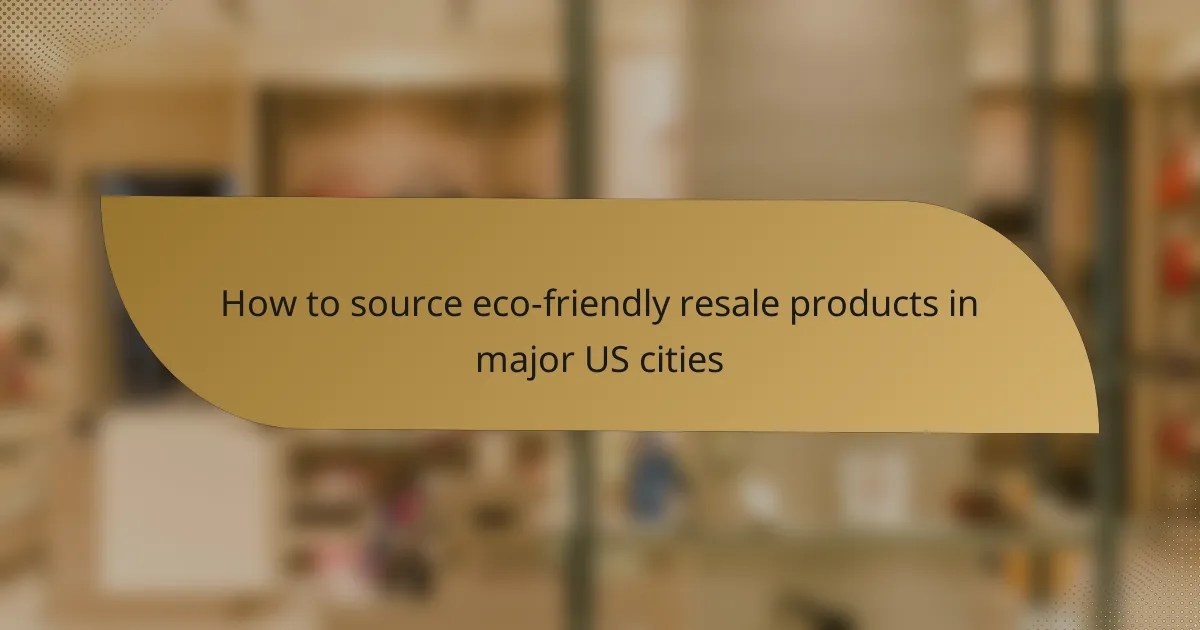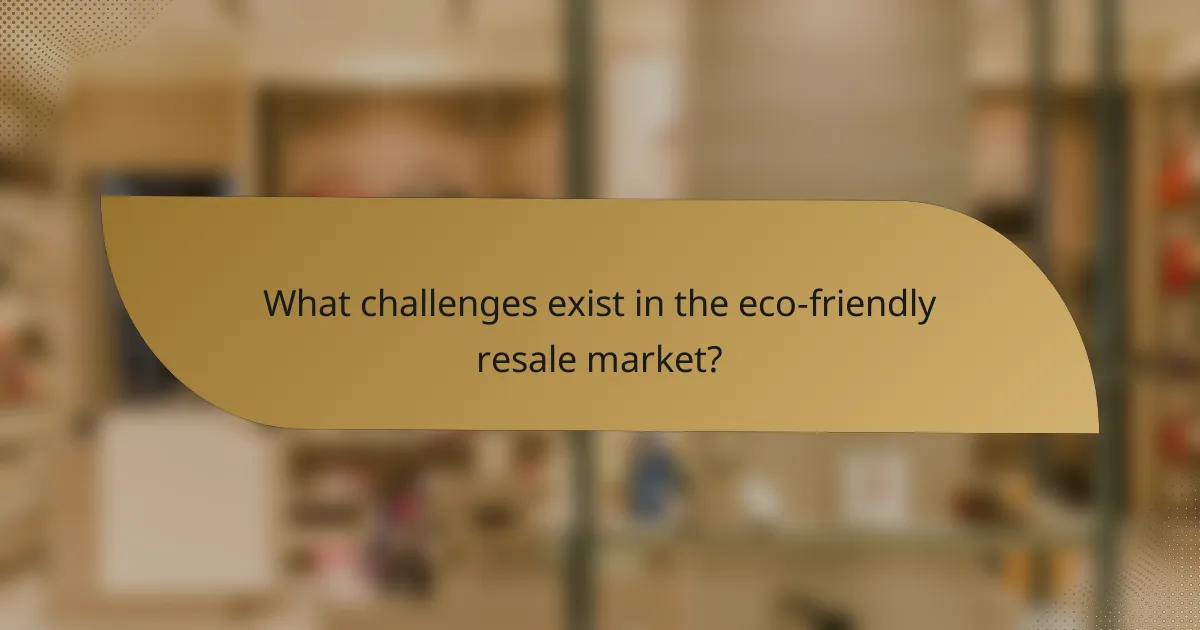As the demand for sustainable living grows, sourcing eco-friendly resale products has become increasingly important. This involves navigating various avenues such as thrift stores, online marketplaces, and community swaps, each presenting unique opportunities and challenges. Additionally, certifications like Fair Trade and GOTS play a crucial role in ensuring the products’ sustainability and ethical sourcing, appealing to environmentally conscious consumers. The evolving market reflects a shift towards products that align with values of sustainability and social responsibility.

How to source eco-friendly resale products in major US cities
Sourcing eco-friendly resale products in major US cities involves exploring various avenues such as thrift stores, online marketplaces, and community swaps. Each method offers unique benefits and challenges, making it essential to understand how to navigate these options effectively.
Thrift stores and consignment shops
Thrift stores and consignment shops are excellent sources for eco-friendly resale products. These establishments typically sell second-hand items, which reduces waste and promotes sustainability. Look for stores that specifically highlight their commitment to eco-friendly practices.
When shopping, check for quality and condition. Items should be gently used, and you may find unique pieces that add character to your collection. Regular visits can yield great finds, as inventory changes frequently.
Online marketplaces like Poshmark
Online marketplaces such as Poshmark provide a convenient platform for sourcing eco-friendly resale products. These platforms allow individuals to buy and sell second-hand items, often with a focus on sustainable fashion. Be sure to filter searches for eco-friendly brands or materials.
Consider the seller’s ratings and reviews to ensure a positive purchasing experience. Additionally, look for listings that include detailed descriptions and clear photos to assess the product’s condition before buying.
Local community swaps
Local community swaps are a fantastic way to source eco-friendly resale products while engaging with your neighborhood. These events allow individuals to exchange items they no longer need for those they want, promoting reuse and reducing waste.
To participate, keep an eye on local community boards or social media groups for announcements. Bring items in good condition and be open to trading. This method not only helps you find eco-friendly products but also fosters community connections.

What certifications should eco-friendly resale products have?
Eco-friendly resale products should ideally have certifications that verify their sustainability and ethical sourcing. Key certifications include Fair Trade, Global Organic Textile Standard (GOTS), and Energy Star, each serving to assure consumers of the product’s environmental and social responsibility.
Fair Trade certification
Fair Trade certification ensures that products are produced under fair labor conditions and that producers receive a fair price. This certification often applies to food items, textiles, and handicrafts, promoting sustainable practices and community development.
When sourcing Fair Trade products, look for the official Fair Trade label, which signifies adherence to strict social, economic, and environmental standards. This label helps consumers support ethical businesses and encourages better trading conditions for marginalized producers.
Global Organic Textile Standard (GOTS)
The Global Organic Textile Standard (GOTS) is a leading textile processing standard for organic fibers, ensuring that textiles are made from at least 70% organic materials. GOTS certification covers the entire supply chain, from harvesting to manufacturing, and includes environmental and social criteria.
To identify GOTS-certified products, check for the GOTS label, which guarantees that the product meets rigorous ecological and social standards. This certification is particularly relevant for clothing and home textiles, appealing to consumers who prioritize organic and sustainable materials.
Energy Star certification
Energy Star certification applies to appliances and electronics that meet energy efficiency guidelines set by the U.S. Environmental Protection Agency. Products with this label consume less energy, helping to reduce greenhouse gas emissions and save on utility bills.
When purchasing eco-friendly resale products, look for the Energy Star label to ensure you are choosing energy-efficient options. This certification is especially important for appliances, lighting, and heating/cooling systems, as it can lead to significant energy savings over time.

What are the current market trends for eco-friendly resale products?
The market for eco-friendly resale products is rapidly evolving, driven by a growing awareness of sustainability and environmental impact. Consumers are increasingly seeking out products that not only meet their needs but also align with their values regarding the planet.
Increased consumer demand for sustainability
There is a noticeable surge in consumer demand for sustainable products, which is influencing the resale market significantly. Shoppers are prioritizing eco-friendly options, often willing to pay a premium for items that are ethically sourced or made from recycled materials.
Brands that embrace sustainability are seeing enhanced loyalty from customers. This trend encourages businesses to adopt greener practices, such as using sustainable packaging and transparent supply chains, to meet consumer expectations.
Growth of second-hand fashion
The second-hand fashion market is experiencing robust growth as consumers turn to resale platforms for unique and affordable clothing options. This shift not only promotes sustainability by extending the lifecycle of garments but also reduces waste in the fashion industry.
Many retailers are now integrating second-hand sections into their offerings, appealing to eco-conscious shoppers. Platforms like Poshmark and Depop have gained popularity, showcasing the demand for pre-owned apparel.
Rise of upcycled products
Upcycled products are gaining traction as consumers seek innovative ways to repurpose materials. This trend involves transforming waste materials into new, high-quality items, thereby reducing environmental impact and promoting creativity.
Brands specializing in upcycled goods often highlight their unique stories, which resonate with consumers looking for one-of-a-kind products. This market segment includes everything from furniture made from reclaimed wood to fashion accessories crafted from discarded fabrics.

How to evaluate the quality of eco-friendly resale products?
Evaluating the quality of eco-friendly resale products involves checking their durability, authenticity of certifications, and the reputation of the brands. These factors help ensure that the products are not only sustainable but also reliable and safe for use.
Inspect for durability and wear
When assessing eco-friendly resale products, inspect them for signs of durability and wear. Look for any visible damage, such as scratches, dents, or frayed edges, which may indicate poor quality. A well-made product should feel sturdy and show minimal signs of previous use.
Consider the material used; natural fibers like organic cotton or recycled plastics often indicate better durability. If possible, test the product’s functionality to ensure it performs as expected, as this can be a good indicator of its longevity.
Check for authentic certifications
Authentic certifications are crucial in verifying that eco-friendly products meet specific environmental standards. Look for labels such as Fair Trade, Global Organic Textile Standard (GOTS), or Energy Star, which indicate compliance with recognized sustainability criteria.
Be cautious of misleading claims; some products may feature vague terms like “eco-friendly” without proper certification. Research the certifying body to ensure its credibility and check if the product has been independently verified.
Research brand reputation
Investigating the reputation of the brand is essential when evaluating eco-friendly resale products. Look for customer reviews and ratings on platforms like Trustpilot or social media to gauge user satisfaction and product performance.
Additionally, consider the brand’s commitment to sustainability practices. Brands that are transparent about their sourcing, manufacturing processes, and environmental impact often have a better reputation in the eco-friendly market. Engaging with the brand’s community can also provide insights into their reliability and ethical standards.

What are the benefits of selling eco-friendly resale products?
Selling eco-friendly resale products offers numerous advantages, including appealing to a growing market of environmentally conscious consumers and contributing to sustainability efforts. These benefits can enhance brand loyalty and potentially increase profit margins.
Attract environmentally conscious consumers
Eco-friendly resale products resonate with consumers who prioritize sustainability in their purchasing decisions. By offering these items, businesses can tap into a demographic that values ethical sourcing and environmental responsibility.
Marketing strategies should highlight the eco-friendly aspects of products, such as their sustainable materials or reduced carbon footprint. Engaging storytelling about the product’s lifecycle can further attract this audience.
Potential for higher profit margins
Eco-friendly products often command higher prices due to their perceived value and the growing demand for sustainable options. Consumers are willing to pay a premium for items that align with their values, which can lead to increased profit margins.
Consider sourcing unique or artisanal eco-friendly products that differentiate your offerings. This can create a niche market where consumers are less price-sensitive, allowing for better profitability.
Contribute to waste reduction
By selling eco-friendly resale products, businesses play a vital role in reducing waste and promoting a circular economy. Reselling items that would otherwise end up in landfills helps minimize environmental impact.
Implementing a take-back program or partnering with local recycling initiatives can enhance your brand’s commitment to waste reduction. This not only supports sustainability but also strengthens community ties and customer loyalty.

What challenges exist in the eco-friendly resale market?
The eco-friendly resale market faces several challenges that can hinder its growth and effectiveness. Key issues include supply chain transparency and competition from fast fashion brands, which often prioritize low prices over sustainability.
Supply chain transparency issues
Supply chain transparency is crucial for ensuring that eco-friendly resale products are genuinely sustainable. Many consumers are concerned about the origins of the products they purchase, yet tracking the entire supply chain can be complex and opaque.
To address these transparency issues, businesses should consider implementing traceability systems that allow customers to see the journey of a product from its source to the resale point. This could involve using technology like blockchain or providing detailed product histories.
Competition with fast fashion
Fast fashion brands dominate the clothing market by offering trendy items at low prices, making it difficult for eco-friendly resale businesses to compete. These brands often produce clothing at a rapid pace, which can attract consumers who prioritize cost over sustainability.
Eco-friendly resale companies can differentiate themselves by emphasizing quality, durability, and the environmental benefits of purchasing second-hand items. Highlighting the unique stories behind each product can also appeal to consumers looking for more meaningful purchases.
